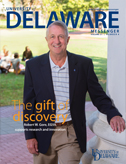Chemist's reaction using 'Goldilocks' catalyst is just right

RESEARCH | Organic chemistry silently infiltrates almost every facet of everyday life, from pigments in modern smartphones, to protectants that increase crop production, to medicines that treat everything from simple colds to the most aggressive cancers.
However, before the next lifesaving medicine, advanced organic-LED touch screen or revolutionary agrochemical can be developed, chemists must have new reactions—“assembly tools,” so to speak—to arrange these complex organic molecules in new and efficient ways.
This is where organic chemist Donald Watson and his research team at UD excel. The assistant professor of chemistry and biochemistry focuses on the development of new reactions that enable the synthesis of complex organic molecules. In particular, he and his group are designing new reaction methods that employ transition-metal elements as catalysts.
A significant portion of the research group's effort has been dedicated to creating new methods to prepare organosilanes, organic compounds that contain silicon atoms. His interest in developing new routes to such compounds stems from their extreme utility and widespread applications in drug synthesis, agrochemical synthesis and materials science.
Silicon is a unique atom in organic chemistry. It is non-toxic, but it imparts very useful reactivity on the molecules that bear the atom. Silicon is also remarkably abundant, Watson adds, which makes it attractive from an economic and environmental standpoint.
Watson’s work in this area has recently been recognized by two highly competitive research awards—a $570,000 Faculty Early Career Development Award from the National Science Foundation (NSF) and a $75,000 Cottrell Scholar Award from the Research Corporation for Science Advancement.
Only 13 Cottrell Scholar Awards were made this year across all fields of chemistry, biochemistry, physics and astronomy. Watson is the second faculty member in UD history to receive this honor.
The NSF Career Award funds his examination of new ways to construct vinyl and allyl silanes using simple alkene starting materials. While their utility has been broadly recognized by organic chemists, “traditional methods for preparing these compounds are difficult and expensive,” Watson says.
This Silyl-Heck Reaction, as he has termed it, is a very simple method to prepare these two types of important organosilanes. In the new method, his group adds silicon to unfunctionalized, or simple, alkenes, which are cheap and widely available.
What makes Watson’s work so novel is his creation of a “Goldilocks” catalyst based on the element palladium to form these carbon-silicon bonds. Using cheap, stable starting materials, he and his team have developed a reaction that increases the complexity of these simple materials by adding silicon through a “just right” balance of size and electronic properties.
The research builds off the Nobel Prize-winning work of UD’s Richard Heck, Willis F. Harrington Professor Emeritus of Chemistry and Biochemistry, whose pioneering developments of reactions to form carbon-carbon bonds through palladium catalysis enabled chemists to make molecules as complex as those created by nature itself.
In addition to funding this bench science, both of Watson's awards include an educational component. Through the NSF Career Award, Watson will partner with UD's NUCLEUS program to establish fellowships for underrepresented students early in their undergraduate careers. With funding from the Cottrell Award, he will help students better understand the concepts behind organic chemistry by developing a bridge course that draws on practical examples of chemistry at work.
Article by Artika Casini, AS05






